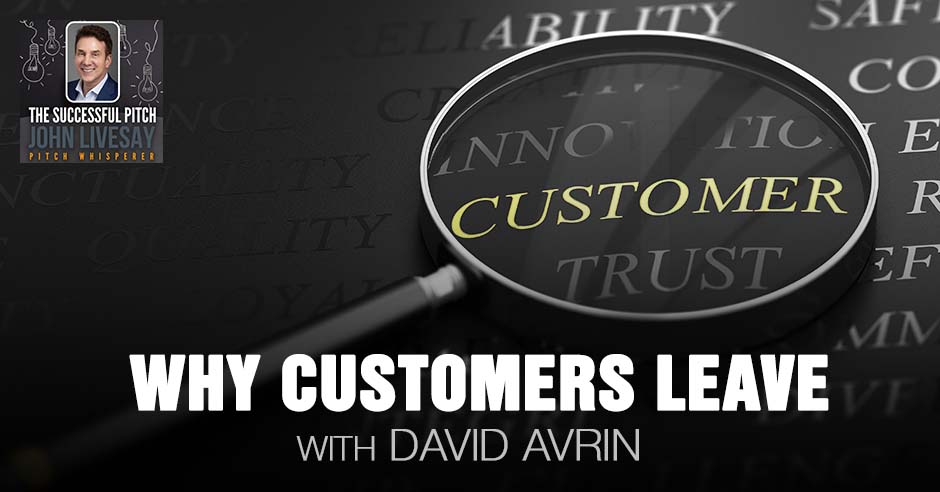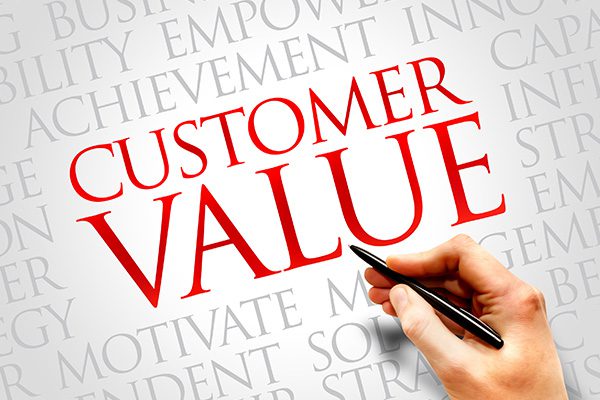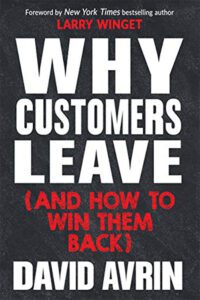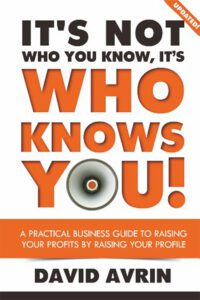Why Customers Leave With David Avrin
Posted by John Livesay in podcast0 comments

Customers have more power now than they had before. If your service or product isn’t great, they won’t think twice about leaving. They’re going to write you a bad review and that could be it for you. It’s very important to understand your customer’s journey really well. Know what they value and offer that to them. The competition is only getting tougher so you need to be conscious, creative, and intentional with how you deal with your customers.
Join John Livesay as he talks to David Avrin about the new landscape of business and why customers leave. David is a best-selling author and an in-demand customer experience speaker. Learn how to properly do your business by putting the customer front-and-center. Start upping your game when it comes to customer experience.
—
Listen to the podcast here
Why Customers Leave With David Avrin
Our guest for this episode is David Avrin who’s the expert on why customers leave and how to get them back. He said, “You need to keep changing to match customers’ ever-changing needs and when your customers have a problem in their mind, you have a problem you need to solve. Reputation is more important than any marketing.” Finally, his big tip is to be ridiculously easy to do business with. Enjoy the episode.
—
Welcome to the show. Our guest is David Avrin who is one of the most in-demand customer experience speakers in the world. He shares his high-energy and content-rich presentations with audiences across North America and the world, including presentations in Singapore, Monte Carlo, London, and Dubai.
He’s the author of five books, including the acclaimed, It’s Not Who You Know, It’s Who Knows YOU!, Visibility Marketing, and Why Customers Leave (and How To Win Them Back). He’s a former CEO Group Leader with Vistage International and a marketing firm owner. He’s also the Chairman of the Legacy Board. David, welcome to the show.
Thanks for having me.
Let’s start with your own story before you became a customer experience expert and speaker. We can go back to childhood, high school, or college.

Customer Experience: With a customer journey, you can have a greater predictability of your customer’s behavior. You can plan and budget for that. The problem is your customers don’t know how they’re supposed to do it.
It was interesting. I’m the second oldest of six and maybe it’s an issue of trying to stand out in a crowded field of competitors for that last slice of pizza, but I was involved in the performance. I did theater and music. I went to college on a full-ride theater scholarship and realized about halfway through that, “At some point, I’m going to have to be able to support a wife and kids.” I didn’t want to see myself doing community theater in God’s Wrath, Iowa when I’m 50 years old. Apologies to those who live in God’s Wrath, Iowa.
Now, playing the father and Captain Von Trapp in The Sound of Music, David.
In with 42 seats in the back of a converted movie house. I went to college and changed my major halfway. I gave up my scholarship and went into Broadcast Journalism. When you got a deep voice people are like, “You should be on the radio.” I did radio for a while and I studied Journalism. When I came out, I have lots of friends in the press. I did PR for several years and they said, “I went to the dark side,” and I became a PR flack.
It was PR and marketing for much of my career as you do. Talk about how we describe what we do in a way that is persuasive, whether it’s for sales, helping politicians with constituents, or corporations better manage their image. It’s how we describe ourselves and communicate that. It was a big part of my career for years.
[bctt tweet=”If there is a problem in the customer’s mind, there is a problem.” username=”John_Livesay”]
In recent years, I’ve come to the recognition that while what we say about ourselves is important, it is less powerful now than what other people say about us. I have made a pretty profound shift in my business, research, and books to talking to organizations about how we provide an experience that creates true differentiation. Now, I speak and consult on customer experience.
With the pandemic and all the complaints, the post-pandemic of shortage of staff makes the service go down. There’s the unspoken second part of it that I wanted your expertise on. If the majority of people in business have any interaction with the public, whether it’s an airline, a restaurant, you name it, or have new people because of turnover, then what happens to all those people’s first day on the job?
You make a lot of mistakes. You leave the restaurant and think you have your order right, and it’s not. Not only is there a shortage of staff causing planes to be canceled or restaurants saying, “We can’t take a reservation,” but when you do get the service, it’s not usually very good because they’re new and that’s another reason to leave. I’m sure you’re seeing that as a speaker. People are going, “Can you help us in this situation?”
We’re seeing it a lot. What’s interesting is customer experience is evolved into a separate discipline, even from customer service. We’ve been talking about customer service for years. If you don’t know how to be nice to people, you’ve got bigger issues in your business. The experience has changed in so many significant ways how we engage with businesses. It’s not just that straight retail transaction.

Customer Experience: Rules and regulations seem to grow every year. The reality is it should be reducing every year. People should be putting leaders in a room to simplify the process.
In 1968, walking into an appliance store and having some old guy or teenager explain the features of a refrigerator. Now, how we communicate, buy, complain, and have products and services delivered to us have changed in profound ways. Back to your point, there are so many mechanisms we can put in place and safeguards that should help to make those situations better, but they don’t. Part of it is because we’ve become a little bit rigid.
Businesses have become wary of so many external forces they cannot control. We can’t control the internet, governments, pandemics, Amazon, or anyone else. We try to control what we can. We create this customer journey. “Here’s how they’re going to learn about us and reach out, contact, communicate, buy, modify or customize, pay, and deliver. All of that works and we tweak it. It works for us if we’re in business. Where it doesn’t, we fix or tweak it. If we can have greater predictability of our customer’s behavior, then we can plan and budget for that.
The problem is your customers haven’t read your employee manual. They don’t know how they’re supposed to do it, but what they are learning is that they can do it faster, cheaper, and more conveniently through so many other retailers that the patience is down to zero. People are getting annoyed very fast. When mistakes happen, we have so many vehicles at our disposal to complain about. We have Yelp, Tripadvisor, Rotten Tomatoes, and Glassdoor, and that social proof has become a primary drive in all of those.
There are all of these things that are converging at the same time that make it very challenging for businesses to compete and keep people happy. That said, here’s my response. “What are you going to do about it?” The nice thing is there are so many great new mechanisms for helping people replicate in some ways of things that Amazon and Apple are doing with being able to track merchandise when you order something when you know it’s coming. “I’ve got furniture delivery coming sometime in the next 45 minutes or so, and it will show up on my phone. They will be at the door.” I don’t know if I’m answering the question, but it is a challenging environment.
[bctt tweet=”You need to change to keep up with customers’ changing needs.” username=”John_Livesay”]
One of the things you have on your website that is a great soundbite is customers are changing, and so if you wanted to stay competitive, you need to change as well. When I spoke at the Coca-Cola CMO Summit, I met the CMO of Domino’s Pizza. I said, “I love your app because it’s so specific. Sally put the pizza in the oven. George is going to deliver it. It will be there in ten minutes. You will have a sense of where things are and who the people are.” He said, “That’s our marketing challenge is to get tech people to come work here.”
For me, that was a big a-ha because I always think of marketing in terms of, “How do we get more customers?” They have to use marketing to get tech people to go there instead of Amazon. That is another way of how things have changed so much that getting the messaging, not just for customers, but also for the right employees to come.
Reputation is important. They call that EX for employee experience. There’s CX for customer experience and then UX for the user experience. Can you do it with facial recognition? If you put in your username and your password and one letter’s wrong in the password, you have to put your username back in, which is so frustrating. That said, a problem in the mind of your customer is a problem.
These tech teams that you’re talking about are trying to shave quarter seconds off the process. Smart companies are simplifying the process. I interviewed somebody on my show who was talking about how the rules and the regulations seem to grow organizations every year. “Here’s a new policy. Here’s a new procedure.” The reality is we should be reducing them every year. We should be putting leaders in a room. “How can we simplify the process? How can we shorten the timeframe? How can we expedite contact, delivery, communication, and complaint resolution?” Smart companies are the ones who are putting a mind toward that customer journey and becoming more customer-centric.

Customer Experience: Companies can’t just form alliances to bolster their offerings, they still need creativity. They need to understand what the customers value and how they can deliver that differently.
We’re looking to shave microseconds off that transaction so that people can get what they want quickly or get resolution faster. They can get communication, delivery, and all of those things. The reality is people won’t wait. It’s not that they’re getting furious. They are, but we can bolt a transaction like that. We have all gotten the email, “You left something in your shopping cart.” There was a reason. Something frustrated us. Something wasn’t intuitive or overly complicated. We know that the next choice is one click away.
For organizations looking to be competitive, walk your customer’s journey and simplify that process. Eliminate hassle, time delays, and frustrations. This is interesting because several years ago, who had the most clever jingle made you more memorable. Now, everybody’s good. I speak across the country and around the world and they argue with me about that all the time. “We’re better at this.” “You might be, but sometimes good enough at a better price point is a better choice. The reality is everybody’s at least good enough because if you weren’t, you would be outed quickly on social media, Yelp, Tripadvisor, and all the above.”
There’s been this universal leveling. The bad players are weeded out pretty quickly. What’s left is a marketplace replete with quality choices. The words are important because we have to be able to clarify and educate our people, get that pitch, get the description and the benefits clear. What people say about you is more meaningful, oftentimes than what we say about ourselves because we trust the preponderance of the evidence. There was some article about Yelp that as much as a third of the reviews are fake. Nobody’s surprised by that, but it starts with the recognition that the world has changed. That’s a real opportunity for a lot of entrepreneurial companies.
Going back to the Domino’s Pizza CMO, he said, “From the time someone has a thought, ‘I want a pizza,’ we want to shorten that time to when they have a pizza at their door and in their mouth.” It’s the same thing with Amazon. I happen to live here in Austin, Texas near one of their distribution centers, and the first time I got something on the same day I ordered it, I looked outside for the drone. I was like, “What?” That’s a whole another level of fast.
[bctt tweet=”What you say about yourself is less powerful today than what other people say about you.” username=”John_Livesay”]
We’re getting that stuff all the time. I saw a story on the news and I was talking to my wife about this. We were watching TV and I’m one of those annoyingly interactive with the TV, “That’s crap.” She nods her head, “Yes, dear.” There was a story about Bed Bath & Beyond. There was a representative from Bed Bath & Beyond that was trying to explain that their revenues had dropped significantly for the last couple of quarters. The person said, “We’ve had supply chain issues. People are frustrated and haven’t been able to find some of the things.”
I looked at my wife and I said, “That’s a complete pile of garbage.” They aren’t down because people couldn’t find what they were looking for at Bed Bath & Beyond. They’re down because people bought their stuff on Amazon. They didn’t go to some other store and say, “I can’t find it. I better go to Amazon.” They go straight to Amazon because it’s that fast. Sometimes it’s the same day. Sometimes it’s the next day. Even retailers are having to think about where their competitive advantage is. “Are they a showroom for the online retailers? Can they be a showroom for their own online presence?”
I saw that big time with Best Buy in electronics. People were coming in and shopping for what they want to go and then go buy it online.
I will freely admit that I’m one of those people. I had to buy a higher-end camera for my studio and I wasn’t going to buy it online. I went in, looked at them, felt them, and compared them, then I walked out, hit buy on Amazon, and bought it for $162 less. Should I feel bad about that?

Why Customers Leave (and How to Win Them Back): (24 Reasons People are Leaving You for Competitors, and How to Win Them Back*)
No, they need to get their pricing competitive. I would love your insights on this. What I find interesting is that Walmart and Target, two typical rivals, join forces to try and compete against Amazon. Because the behavior is so ingrained and I’ve got the Prime membership already, it’s working, and you’re not going to give me a cheaper price than Amazon, I’m not so sure that even the Walmart-Target combination can’t get people to change the behavior. There’s no real reason to change unless Amazon messes up that I would maybe consider getting stuff.
It’s interesting. We’re going to see a lot of creative alliances. We’re seeing that certainly in media with a lot of integration on some of the media outlets. We’re seeing that integration in terms of home security, Wi-Fi, ring doorbells, and all of that as well. We’re going to see a lot of that to bolster the offering to be more competitive, but it also requires and continue to require a pretty high level of creativity of recognizing being more customer-centric, understanding what we value as customers, and being able to deliver that differently. Not everybody can do what everybody can do. The question is, “What can you do?”
I was talking to a huge group of small business owners, probably 1,500 in the audience. I did a session afterward. They were saying, “We can’t compete with Amazon and they’re doing free shipping. We can’t afford that.” I said, “What can you do?” The whole idea of positioning yourself as a specialist in a sea of mega generalists is a real opportunity.
I always counsel clients, “Never trash your competitors ever. Compliment your competitors. Just don’t compliment what your customer needs.” You say, “They’re phenomenal if you need this and this, but this is what we do. We do this better than anyone. Everything we do is geared towards delivering this.” “That’s what I need.” “We’re a better choice.” You aren’t one of many different things.
[bctt tweet=”When dealing with customer, you have to be conscious, creative, and intentional. You can’t afford to be in cruise control right now.” username=”John_Livesay”]
I talk about it and not drowning in a sea of sameness and stories that you can share and make you memorable of what makes you unique. You travel so much and a lot of people can relate to this. It’s that excuse you were referring to with Bed Bath & Beyond. If the planes are being canceled now and they go, “It’s the weather or pilot shortage,” I’m like, “I don’t believe it. You didn’t sell enough tickets. It’s not profitable to have this flight go out half empty, so you’re canceling the flight and jamming us all into another one.” My question is it’s not a shock why customers leave, but it’s more about how we win them back. What can an airline do to win them back or do they even care about winning us back?
You stand in any line at an airport and there is constant exasperation up and down the line. You look at the people look and they’re like, “Unbelievable. What’s going on?” They do know what they’re doing, but they’re wrestling a lot of beasts. I don’t have a lot of sympathy for them because we’re all paid full-time wages to get the job done, but we’re seeing it worldwide.
We’re coming out of the pandemic. There was no script for this. What they thought was a great short-term measure to save revenue is they gave early retirement to a lot of people, and then everything came roaring back. The part I will fault them for is they continued to sell tickets for flights that they didn’t know they had pilots for. They assumed they would find some way, even though understanding it takes weeks.

Visibility Marketing: The No-Holds-Barred Truth About What It Takes to Grab Attention, Build Your Brand and Win New Business
I’ve been speaking for 25 years. I’ve never missed a scheduled presentation. Six times, I’ve driven all night to make it to an event. Eventually, knock on wood here, something’s going to happen, but in the last few weeks, I’ve been at three events where a speaker was unable to show up for their time slot. This is my livelihood. This feeds my family and my staff. It’s the same thing when somebody needs something delivered to their home. What’s the backup?
I spoke at a huge conference of major manufacturers. They’re backed up for several months because of supply chain issues. They were talking about 600 vehicles sitting on a lot for a year, waiting for a small motor for the windshield wiper blades that they could not deliver to their clients. It’s going to take years. There is no political party that is to blame because this is global. If I had the answer, I would be far too rich to be taking time to be on shows with my good friends and colleagues. We’ve got to be conscious, creative, and intentional, but nobody can afford to be in cruise control mode.
Speaking of being creative, your website is one of the best I’ve seen for speakers.
Thank you, sir.
24 countries, 13 lost luggages, 1 million plus miles flown, 3 million plus laughs, and 0 events missed. You have a strategy to make sure you can continue to deliver on that promise. Putting it in there in a playful way is also creative. I’ve never seen anybody else do it.
Think about this in terms of the pitch. Let’s take it back to that. What is it that in every industry, there are certain criteria that the people buy from you or looking for? First and foremost, it’s safety. Is this a safe choice? Am I going to get screwed? Can I mitigate the risk? If it is package delivery, you mitigate through risk by giving a tracking number. It also reduces the number of incoming calls from people checking the status.
In my industry, the number one concern is whether it is going to be relevant and well-received. I put a video to alleviate that. They can watch me speak and see what I’m doing. When I throw in little funny things like zero missed engagements, that says something. Maybe it’s subliminal or other, but it’s important for every business to say, “What are the criteria by which the people are choosing between competitors? Are they going to hire you?”
They’re saying, ” I have a need and a number of options. Who’s the best choice for me? Who’s the safest choice? Who’s the most tailored choice?” It’s the same thing when we talked about the specialist over the generalist. When I go to a professional speaker’s website and they say, “Specializing in leadership, change, future, and marketing,” I’m not going to hire them for any of those things because if I need somebody who’s a futurist. I’m going to hire somebody that’s all they do because it’s their gig. They’re futurists.

It’s Not Who You Know, It’s Who Knows YOU! A Practical Business Guide to Raising Your Profits By Raising Your Profile
What I love is the story behind the six times you had to drive. That shows the willingness to do what it takes to have zero events missed. In addition to double booking flights, driving when you need to, cars, planes, and whatever, there also is a subliminal message there that you keep yourself healthy. I saw a speaker posting about having to give a talk with a bad back going out. You never know what’s going to happen. You can still get to the city and then have something go wrong. There’s a lot of thought that goes into it. You’re probably not out partying the night before an event.
If I did, they would never know. Here’s the other thing. I don’t understand this. I’m an oversharer on social media, but sharing every time that you’ve got sick, or “I’m at this event. I feel horrible,” sounds heartless. They have booked you several months in advance. They have 900 people sitting in that audience, but it’s the same thing. I have this video series called The Morning Huddle that I have a new book based on.
Don’t be the hero of your own story. “Look what a martyr I am.”
It goes back to the story, but we deliver because people are relying on us. Whether it’s our staff, our family, our audience, or our customers, we step up.
If anybody wants to book you as a speaker and get your books, they can find all of them on your website, DavidAvrin.com. Is there a last quote or thought you want to leave us with?
The last thought is the real key post-pandemic in the new world is you can win in business. Quality is a foundation by being ridiculously easy to do business with. Don’t make your people work for it. I’m so geeked out on new technology. I’m so bullish on the opportunities that have come about as a result. In many ways, COVID accelerated what’s long been predicted about how we’re going to do business. The ones who sit back, waiting for the cheese to come back are going to be left behind. There are huge challenges, but that creates opportunities for those who are willing to do more, and I am.
I love it. Note, be easy to work with. Thank you so much, David. It’s been a pleasure hearing your stories and wisdom.
Be well.
Important Links
- David Avrin
- It’s Not Who You Know, It’s Who Knows You – Amazon
- Visibility Marketing – Amazon
- Why Customers Leave (and How To Win Them Back) – Amazon
- The Morning Huddle
- The Morning Huddle book – Amazon
- Better Selling Through Storytelling Method Online Course
Wanna Host Your Own Podcast?
Click here to see how my friends at Podetize can help
Purchase John’s new book
John Livesay, The Pitch Whisperer
Share The Show
Did you enjoy the show? I’d love it if you subscribed today and left us a 5-star review!
- Click this link
- Click on the ‘Subscribe’ button below the artwork
- Go to the ‘Ratings and Reviews’ section
- Click on ‘Write a Review’
Love the show? Subscribe, rate, review, and share!
Join The Successful Pitch community today:
- JohnLivesay.com
- John Livesay Facebook
- John Livesay Twitter
- John Livesay LinkedIn
- John Livesay YouTube
Tags: Customer Behavior, customer experience, Customer Journey, Differentiating Yourself, Public Relations, Simplifying The Process
